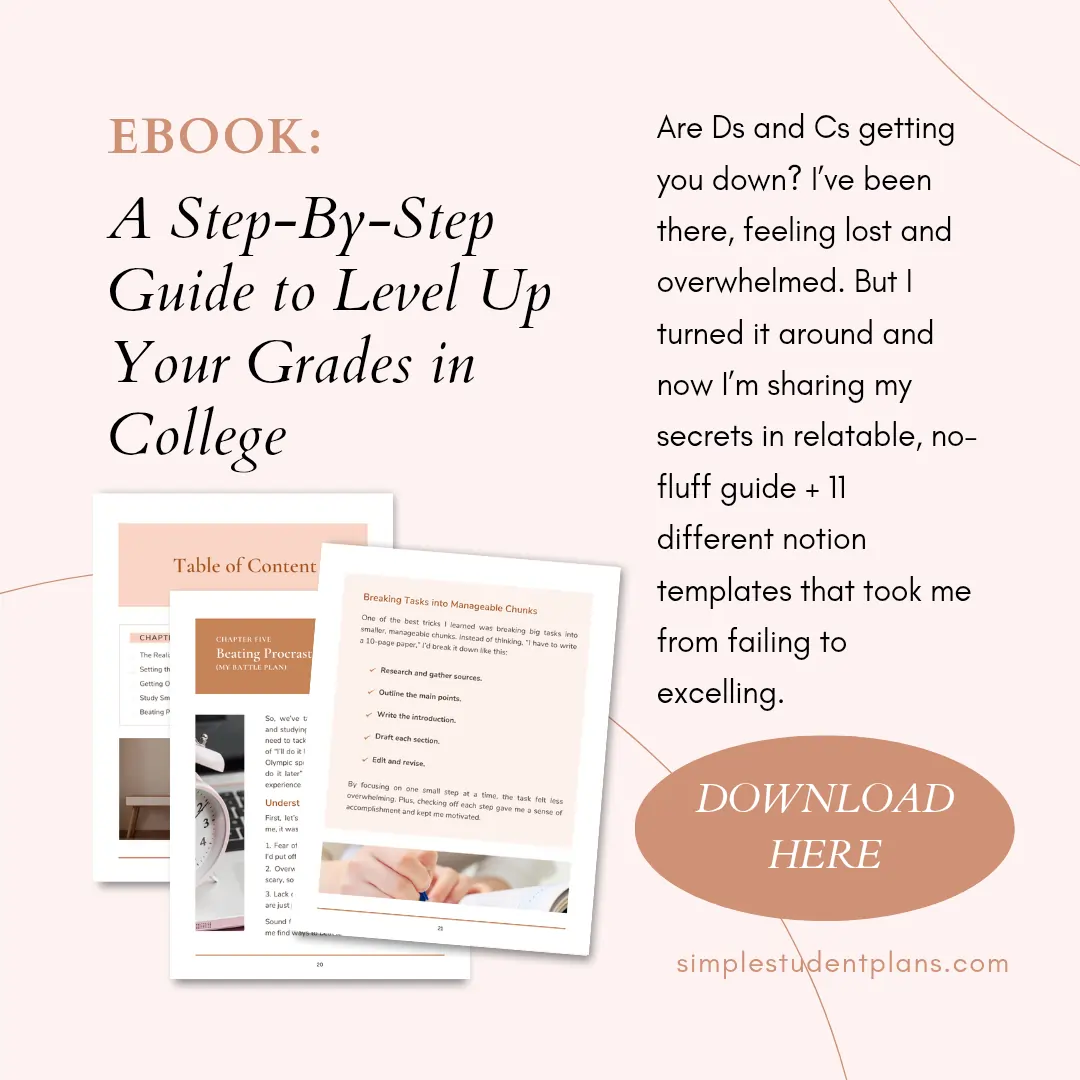Being a student isn’t easy. Between lectures, assignments, group projects, exams, and maybe even part-time jobs, it can quickly feel overwhelming. Some students, however, seem to have everything under control. Their notes are tidy, their assignments are on time, and they still manage to make space for hobbies, friends, or even Netflix nights.
So, what’s their secret?
As an affiliate partner of various brands and sponsored content, SimpleStudentPlans may earn commission on qualifying purchases. Disclaimer | Advertise With Us
It’s not about being naturally “gifted” at organization. Instead, it’s about adopting smart habits that set them apart from the rest. In this post, we’ll talk about 9 things organized students do differently and how you can apply these habits to your own academic life.
Whether you’re in high school, college, or grad school, these practical tips will help you stay on top of your workload, reduce stress, and actually enjoy your learning journey.
1. They Plan Ahead (and Stick to It)
One of the biggest differences between organized students and everyone else is their approach to planning.
Instead of waiting until the last minute, they:
- Use planners or digital tools like Notion, Google Calendar, or even a good old-fashioned notebook.
- Break down assignments into smaller tasks (research → outline → draft → edit).
- Schedule study sessions just like appointments they can’t miss.
“Planning is bringing the future into the present so that you can do something about it now.” – Alan Lakein
Pro tip: If you’re a tactile learner, a physical planner like this academic planner can be a game-changer. If you’re more digital, apps with reminders and notifications can keep you accountable.
Example of a Weekly Student Planner Layout
| Day | Tasks | Priority | Completed? |
|---|---|---|---|
| Monday | Read Chapter 4, outline essay | High | ☐ |
| Tuesday | Group project meeting | Medium | ☐ |
| Wednesday | Review flashcards | Medium | ☐ |
| Thursday | Write essay draft | High | ☐ |
| Friday | Submit assignment | High | ☐ |
2. They Create a Study Routine
Organized students don’t just study “whenever they feel like it.” They create routines that become second nature.
- Fixed study hours – For example, two hours every evening after dinner.
- Study rituals – Like clearing their desk, turning off distractions, and having a cup of tea nearby.
- Consistency over intensity – Instead of cramming, they spread their study sessions across the week.
Think of it like going to the gym: you see results not from one long, exhausting session, but from consistent effort over time.
Try the Pomodoro Technique: Study for 25 minutes, take a 5-minute break, and repeat. Tools like Focus Booster can help.
3. They Keep Their Space (and Digital Life) Organized
A cluttered desk leads to a cluttered mind. Organized students know that an environment affects productivity.
Physical Space Habits:
- Keep only essentials on the desk (laptop, notebook, pen).
- Store supplies in drawers or organizers.
- Do a 5-minute clean-up before or after studying.
Digital Space Habits:
- Create clearly labeled folders on their laptop.
- Use cloud storage (Google Drive, Dropbox) to avoid losing files.
- Turn off distracting notifications while working.
Invest in simple desk organizers like this affordable set. It may sound small, but having a clean desk makes sitting down to study so much easier.
4. They Prioritize, Don’t Just “Do It All”
Organized students don’t try to do everything at once. They use prioritization strategies to focus on what matters most.
Two methods they often use:
- Eisenhower Matrix:
- Urgent + Important → Do now
- Important + Not Urgent → Schedule
- Urgent + Not Important → Delegate (if possible)
- Not Urgent + Not Important → Drop
- MITs (Most Important Tasks): Pick 2–3 key things to finish each day.
Example of Prioritization
| Task | Category | Action |
|---|---|---|
| Essay due tomorrow | Urgent + Important | Do now |
| Exam in 2 weeks | Important + Not Urgent | Schedule study time |
| Club meeting | Urgent + Not Important | Decide if attendance is necessary |
| Scrolling TikTok | Not Important | Drop |
5. They Use Smart Note-Taking Methods
Instead of copying everything word-for-word, organized students use note-taking methods that make reviewing easier later.
Popular methods include:
- Cornell Method – Divide page into cues, notes, and summary.
- Outline Method – Use bullet points and indentation.
- Mind Mapping – Create visual diagrams for connections.
Tools like GoodNotes (iPad app) or a digital stylus can make note-taking more engaging.
Example of the Cornell Method layout:
| Cue | Notes | Summary |
|---|---|---|
| Key concept | Detailed explanation | Short summary of page |

6. They Avoid Multitasking
It may feel productive to “study while texting” or “write an essay while watching TV,” but science shows multitasking reduces focus and memory retention.
Organized students:
- Work in single-task mode.
- Use timers to stay on track.
- Batch similar tasks together (e.g., responding to emails all at once).
Try apps like Forest (which grows a virtual tree while you stay focused).
7. They Make Time for Rest and Self-Care
Being organized doesn’t mean working 24/7. In fact, burnout makes you less productive.
Organized students:
- Prioritize sleep (at least 7–8 hours).
- Take breaks and practice hobbies.
- Exercise or at least stretch between study sessions.
“Almost everything will work again if you unplug it for a few minutes… including you.” – Anne Lamott
A relaxed brain learns faster and remembers better.
8. They Ask for Help (Instead of Struggling Alone)
Organized students know when to seek guidance. Instead of waiting until it’s too late, they:
- Attend office hours.
- Join study groups.
- Ask classmates or tutors for help.
- Use online resources (Khan Academy, Coursera, YouTube).
If you’re shy about asking in class, email your professor. Many students forget that professors want you to succeed.
9. They Reflect and Adjust Their Strategies
Lastly, organized students regularly reflect on what’s working and what’s not.
They ask themselves:
- Did I meet my study goals this week?
- What distracted me most?
- How can I improve next week?
This continuous cycle of reflection and adaptation helps them stay flexible and effective.
Key Takeaways
- Planning and routines make a huge difference.
- Clean spaces = clear mind.
- Prioritization is the secret to avoiding overwhelm.
- Single-tasking > multitasking.
- Rest, reflection, and support are just as important as study time.
By adopting even a few of these things organized students do differently, you’ll notice more productivity, less stress, and better results in your academic life.
FAQ: Things Organized Students Do Differently
Q1: Do I need to be naturally organized to succeed in school?
No! Organization is a skill anyone can learn. Start small with one habit (like using a planner) and build from there.
Q2: How long does it take to become more organized as a student?
It depends on consistency. Most students see results within a few weeks of sticking to routines and strategies.
Q3: What tools should I invest in first?
Start with a planner (digital or physical), a few desk organizers, and reliable cloud storage. You don’t need expensive tools to get organized.
Q4: Can I still be organized if I’m naturally messy?
Yes! Organization is more about systems than personality. Even if you’re messy by nature, having routines and checklists can keep you on track.
Final Thoughts
The habits of organized students aren’t magic, they’re intentional practices that anyone can adopt. By planning ahead, creating systems, and making time for balance, you’ll find yourself not just keeping up with your studies, but thriving.
So, which habit will you start with today?
